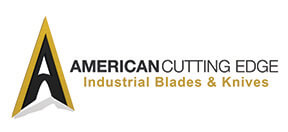Food Processing
-
Purchasing the right replacement knives and blades for your OEM equipment should be effortless. We've spoken before about how industrial knife manufacturers like ACE can help customers optimize cutting performance. Skilled industrial knife manufacturers can be an excellent resource for supplying the replacement industrial machine knives, razor blades, and wear parts you need.
Today's blog focuses on the meat skinner blades made by ACE vs. those manufactured by the OEM. American Cutting Edge manufactures meat skinning blades that are compatible with the largest OEMs in the business including Maja® and Townsend®.
Independent laboratory testing of ACE brand skinner
-
Food Processing Blades There's much more to your replacement food processing blades than the price you pay for them. Many food processing companies don't stop to think about all the factors that go into their cutting and processing application, instead of focusing purely on choosing a partner based on the lowest cost provider. Some companies don't realize they have a choice when it comes to replacing their knives and blades.
Food processing equipment requires blades with tight tolerances, which means that quality matters more than ever when choosing your supplier. There's no question that the quality of the blade or knife makes all the difference in any cutting operation. It's the ability to maintain a sharp cutting edge and blade stability that can make or break a production facility whether they're processing meat, vegetables, packaging dry goods, or fresh food.
Blade Material – You Have Options
Of particular
-
Packaging food for preservation and future use is far from a modern-day innovation. While studying ancient Egypt, historians have found evidence of food packaging that dates as far back as 3,500 years ago. As society has advanced, packaging has continued to evolve to meet the ever-changing needs of society including food safety and product stability.
Over the last two years, the packaging industry has been forced to think out of the box and pivot its operations quickly due to the global pandemic. With no immediate end in sight, it goes without saying that this trend to be flexible and think outside the box will be ongoing as will the need for improved cutting applications.
Some of the trends we're focusing on for this blog aren't new but have been building momentum over time.
Sustainability
As knowledge and awareness
-
The history of adding carbon to iron dates back to 400 BC when Indian metalworkers devised the very first smelting method. Known as Wootz steel, the material was shipped across the world and was used to forge Damascus steel swords. Rumored to be sharp enough to cut feathers in midair and slice through a rifle barrel, these weapons were renowned for their toughness, resistance to shattering, and ability to be honed into a resilient, sharp edge while still remaining flexible.
Why Blade Material Matters in Meat Processing
While your skinning knives don't have to cut through a rifle barrel or feathers,
-
There’s a lot to be said for simplification whether you’re thinking about clearing the clutter in your office, streamlining your schedules, or committing to meal planning at home. The idea of simplifying boils down to making life easier. If you’ve ever consolidated your bills or cleared out items by donating to charity, you’re familiar with how effortless things can be when they are simpler.
This concept extends to manufacturing operations of all kinds when organizations look at their vendor and procurement policies.
“Simplicity is the prerequisite for reliability.” – Edsger Dijkstra
What is Vendor Consolidation?
Vendor consolidation is a cost-reduction strategy that involves reducing the number of suppliers for your business to a few or in some cases even one.

